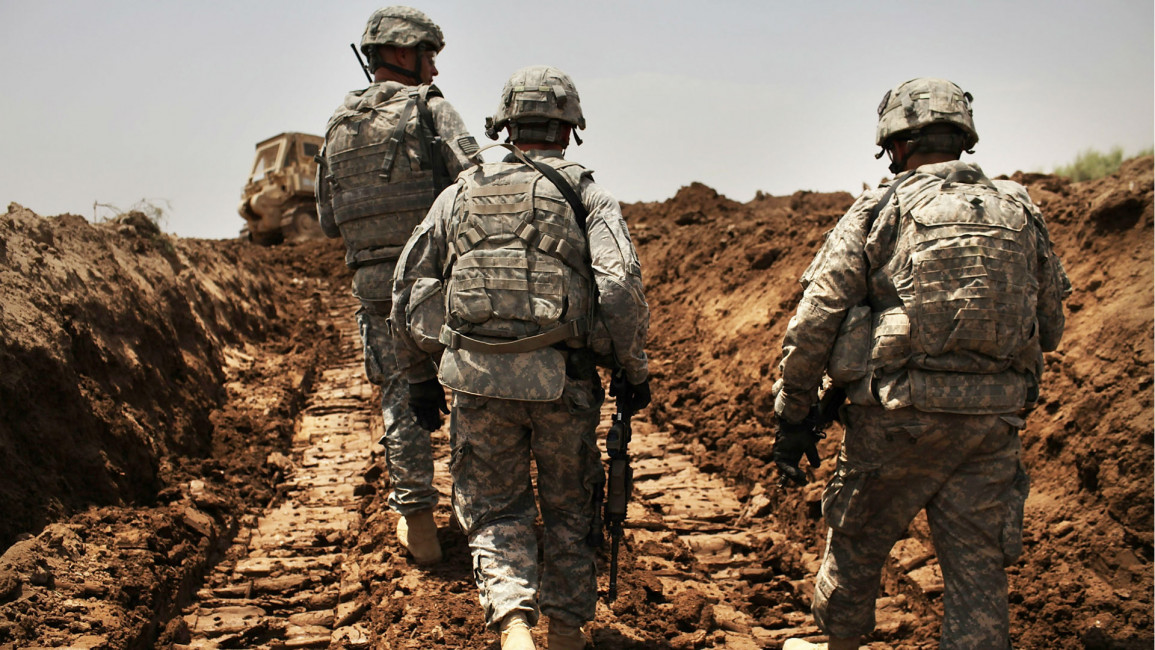IS chemical weapons expert arrested following new gas attack
IS chemical weapons expert arrested following new gas attack
The capture of an Islamic State group operative has been played down by Iraqi officials.
2 min read
US forces continue to target IS in Iraq [Getty]
An Islamic State group operative captured by US special forces in Iraq last week is a chemical weapons expert, US military officials have said.
The prisoner, identified by media as Sleiman Daoud al-Afari, is thought to have formerly worked for Saddam Hussein's regime.
Afari's capture was confirmed by a US official, who said his interrogation had yielded "good things".
The IS figure was captured by special forces recently deployed by the Pentagon to carry out raids against the Islamic State group. He is currently detained in Iraq, one of the officials said.
On Wednesday, Pentagon spokesman Jeff Davis would not confirm that the captured man was an IS chemical weapons expert.
"We know that [IS] has used chemical weapons on multiple occasions in Iraq and Syria," he said.
The news coincides with the release of leaked documents containing the details of more than 22,000 IS militants.
Iraqi officials, however, downplayed news of the arrest.
"Washington certainly has the capacity and capability to arrest and kill leaders," said Hamid al-Mutlaq, deputy chairman of the parliamentary security committee.
But reports of Afari's detention and interrogation were "uncertain", he added.
Hassan Jowari is an Iraqi security expert. "The US carried out operations in a number of areas in Iraq and arrested a number of leaders from IS, but these operations are still the focus of questioning by many government officials and even ordinary citizens," he said.
He stressed the importance of "an official explanation from the Iraqi government".
Meanwhile, reports on Wednesday said a village in northern Iraq had become the latest target of a chemical attack.
None of the 40 casualties died, but five remain in hospital, in a mainly Shia Turkmen village 12 miles south of Kirkuk.
"There were poisonous substances in these shells. We don’t know what," Kirkuk province governor Najmuddin Kareem was quoted as saying.
In February, US Director of National Intelligence James Clapper and CIA Director John Brennan for the first time openly accused the Islamic State group of using chemical weapons, including mustard gas, in Iraq and Syria.
Sources close to the Organisation for the Prohibition of Chemical Weapons confirmed last month that mustard gas was used in fighting in August in northern Iraq, without specifically blaming IS for the attack.
Agencies contributed to this report
The prisoner, identified by media as Sleiman Daoud al-Afari, is thought to have formerly worked for Saddam Hussein's regime.
Afari's capture was confirmed by a US official, who said his interrogation had yielded "good things".
The IS figure was captured by special forces recently deployed by the Pentagon to carry out raids against the Islamic State group. He is currently detained in Iraq, one of the officials said.
On Wednesday, Pentagon spokesman Jeff Davis would not confirm that the captured man was an IS chemical weapons expert.
"We know that [IS] has used chemical weapons on multiple occasions in Iraq and Syria," he said.
The news coincides with the release of leaked documents containing the details of more than 22,000 IS militants.
Iraqi officials, however, downplayed news of the arrest.
"Washington certainly has the capacity and capability to arrest and kill leaders," said Hamid al-Mutlaq, deputy chairman of the parliamentary security committee.
But reports of Afari's detention and interrogation were "uncertain", he added.
Hassan Jowari is an Iraqi security expert. "The US carried out operations in a number of areas in Iraq and arrested a number of leaders from IS, but these operations are still the focus of questioning by many government officials and even ordinary citizens," he said.
He stressed the importance of "an official explanation from the Iraqi government".
Meanwhile, reports on Wednesday said a village in northern Iraq had become the latest target of a chemical attack.
None of the 40 casualties died, but five remain in hospital, in a mainly Shia Turkmen village 12 miles south of Kirkuk.
"There were poisonous substances in these shells. We don’t know what," Kirkuk province governor Najmuddin Kareem was quoted as saying.
In February, US Director of National Intelligence James Clapper and CIA Director John Brennan for the first time openly accused the Islamic State group of using chemical weapons, including mustard gas, in Iraq and Syria.
Sources close to the Organisation for the Prohibition of Chemical Weapons confirmed last month that mustard gas was used in fighting in August in northern Iraq, without specifically blaming IS for the attack.
Agencies contributed to this report


![President Pezeshkian has denounced Israel's attacks on Lebanon [Getty]](/sites/default/files/styles/image_684x385/public/2173482924.jpeg?h=a5f2f23a&itok=q3evVtko)



 Follow the Middle East's top stories in English at The New Arab on Google News
Follow the Middle East's top stories in English at The New Arab on Google News


